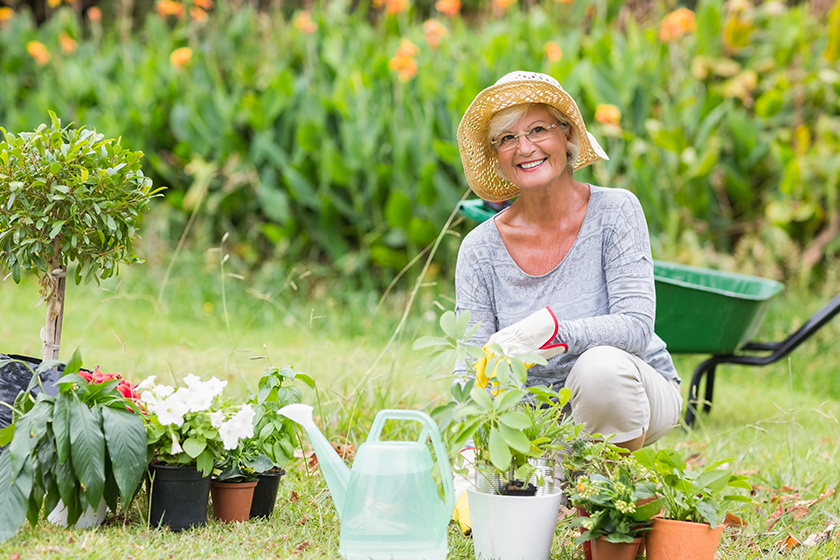Gardening for seniors can be a source of immense joy, relaxation and accomplishment. It offers both physical activity and emotional fulfillment. This will foster a deeper connection with nature.
However, as we age, certain gardening tasks might require adjustments to make sure they remain enjoyable and safe. Here are some thoughtful tips to help make gardening a rewarding experience at any age.
Embrace Raised Garden Beds and Containers
Raised garden beds and containers can transform the gardening experience, minimizing the need for bending and kneeling. They elevate the soil to a comfortable height. This allows you to tend to your plants without straining your back or knees.
Beyond practicality, they also provide an excellent way to manage soil quality and pest control. No matter if you’re growing flowers, vegetables or herbs, these solutions can bring the garden closer to you.
Invest in Ergonomic Gardening Tools
Ergonomic tools are a game-changer for anyone seeking to reduce physical strain while gardening. Tools with cushioned grips and extended handles are specifically designed to minimize stress on joints and muscles.
Lightweight options are also widely available. This makes them easier to handle. Whether it’s a trowel, pruner or spade, the right tool can make a significant difference in your comfort and productivity.
Create Accessible Pathways
Clear, well-planned pathways are necessary for a safe and enjoyable gardening experience. Wide, stable paths make it easier to move around, particularly when you use a walker or cane. Consider using non-slip materials, such as pavers or gravel, to prevent falls. A carefully designed garden with accessible paths can enhance both safety and aesthetics.
Plan Your Garden with Intention
Before diving into planting, take the time to plan your garden thoughtfully. Choose low-maintenance plants that suit your climate and require minimal effort to thrive.
Perennials, for example, are an excellent choice as they return year after year with little intervention. Group plants with similar watering needs to simplify your routine. This makes irrigation more manageable and efficient.
Take Regular Breaks
Gardening is a fulfilling activity. However, it’s important to pace yourself. Overexertion can lead to fatigue or injury, so take frequent breaks to rest and hydrate.
Set manageable goals for each session and enjoy the process rather than rushing through it. By pacing yourself, you can extend your time in the garden without feeling overwhelmed.
Incorporate Comfortable Seating
Strategically placed seating throughout your garden can provide a welcoming spot to rest and admire your hard work.
Benches or lightweight folding chairs are ideal options, especially if you prefer to work in short bursts. Comfortable seating also allows you to enjoy the therapeutic effects of simply being in nature.
Stay Mindful of Sun Protection
Spending time outdoors has many benefits, but prolonged sun exposure can be harmful. Wear a wide-brimmed hat, lightweight long sleeves and sunscreen to protect your skin. Gardening during cooler parts of the day, such as early morning or late afternoon, can also reduce the risk of overheating.
Utilize Drip Irrigation Systems
Watering plants can become a physically demanding task, particularly in larger gardens. Drip irrigation systems present a convenient solution by delivering water directly to the roots of your plants.
This not only saves time and energy but also conserves water by reducing evaporation. For smaller gardens, soaker hoses are another efficient and affordable option.
Focus on Raised Seating Gardens
If bending is a challenge, consider creating a raised seating garden where you can sit comfortably while working on your plants. Elevated platforms or tiered planters allow you to enjoy the tactile joys of gardening without discomfort. These setups can be customized to fit your available space and personal preferences.
Make Gardening a Social Activity
Gardening doesn’t have to be a solo endeavor. Inviting friends or family members to join you can make the experience more enjoyable and less physically demanding. Sharing tasks and exchanging ideas can add a social element to your gardening routine while fostering deeper connections.
Reap the Therapeutic Benefits
Gardening is not just about growing plants—it’s also a way to nurture your well-being. The act of digging, planting and tending to greenery can reduce stress and improve mental clarity. The sights, smells and textures of a garden provide sensory stimulation that enhances mood and promotes relaxation.
Gardening for seniors is an ageless activity. It offers endless opportunities for creativity, exercise and mindfulness. With these tips, you can adapt your gardening practices to suit your needs while continuing to enjoy the countless benefits it brings.
Remember, the goal is to make your time in the garden as rewarding and safe as possible. This helps it remain a beloved hobby for years to come.
Explore our retirement community and senior living options today.







